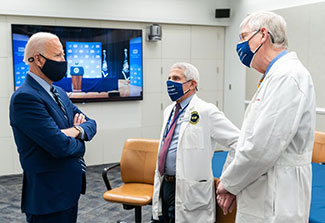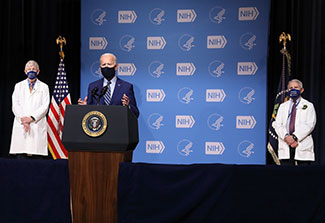Biden team elevates science, global engagement
January / February 2021 | Volume 20 Number 1

Photo courtesy of the White House
U.S. President Joe Biden visited NIH recently, where he was
greeted by Dr. Anthony Fauci (center) and Dr. Francis Collins
(right). Biden has appointed Fauci his chief medical adviser on
COVID-19 and asked Collins to remain as NIH director.
In his first weeks in office, U.S. President Joe Biden has taken steps to elevate the role of science in government, re-engage with the global community to combat the COVID-19 pandemic and advance global health, and renew the U.S. commitment to the WHO.
The White House has released a 200-page
strategy for COVID-19 response and pandemic preparedness, which includes plans to restore U.S. leadership in strengthening global capacity to combat future disease threats. “The United States will promote sustainable global health and global health security, rebuild health security alliances, elevate U.S. efforts to support the Global Health Security Agenda, and revitalize U.S. leadership,” the document states.
On his second day in office, the President signed measures to allow the
U.S. to rejoin the WHO and invited the NIH’s Dr. Anthony Fauci to represent the U.S. at the WHO’s virtual board meeting. Fauci
told the gathering the U.S. will honor its financial commitments and rebuild U.S. engagement with the organization. “The United States stands ready to work in partnership and solidarity to support the international COVID-19 response, mitigate its impact on the world, strengthen our institutions, advance epidemic preparedness for the future, and improve the health and wellbeing of all people throughout the world,” said Fauci.
WHO Director-General Dr. Tedros Adhanom Ghebreyesus welcomed the pledge. “WHO is a family of nations,” he said. “And we are all glad that the United States is staying in the family.”
Fauci also reported the U.S. will stop its draw down of staff seconded to the WHO and will resume engagement both directly and through its WHO Collaborating Centers. “The United States sees technical collaboration at all levels as a fundamental part of our relationship with WHO, one that we value deeply and will look to strengthen going forward,” he said.
The U.S. also has announced it will join the ongoing international efforts to develop, produce and equitably distribute COVID-19 vaccines, therapeutics and diagnostics - the
COVID-19 Vaccines Global Access Facility, known as COVAX, and the
Access to COVID-19 Tools (ACT) Accelerator.

Photo by Chia-Chi Charlie Chang for NIH
U.S. President Joe Biden spoke at NIH recently, and was joined
by Dr. Francis Collins (left) and Dr. Anthony Fauci (right).
In a show of support for Africa,
Biden addressed the virtual African Union Summit in February to express a willingness to help defeat COVID-19 and advance health security. “The United States stands ready now to be your partner in solidarity, support and mutual respect,” he said. “We believe in the nations of Africa and in the continent-wide spirit of entrepreneurship and innovation.”
The White House also issued an
executive order to rescind the so-called Mexico City policy, which withheld U.S. funding from international organizations that provide - or offer information about - abortions.
In personnel matters, the Administration announced that NIH Director Dr. Francis S. Collins - who has served since 2009 - has been asked to remain in his position. NIH’s other political appointee, Dr. Ned Sharpless, was also invited to stay on as head of the National Cancer Institute (NCI). In addition to continuing in his role leading the National Institute of Allergy and Infectious Diseases (NIAID), Fauci was named the President’s chief medical adviser on COVID-19.
Biden also
re-established the Directorate on Global Health Security and Biodefense at the U.S. National Security Council. In addition, he announced he is resurrecting the President’s Council on Science and Technology and elevating the White House Office of Science and Technology Policy Director to a cabinet-level position.
Finally, Biden issued a plan to review existing
government scientific integrity policies to determine if they adequately prevent “improper political interference” in the conduct of research and data collection, and stop suppression or distortion of findings. The President stated his Administration will make evidence-based decisions guided by the best available science and data. “Scientific findings should never be distorted or influenced by political considerations.”
More Information
-
National Strategy for the COVID-19 Response and Pandemic Preparedness
The White House, January 21, 2021 -
Letter to His Excellency António Guterres on the U.S. intention to remain a member of the WHO
The White House, January 20, 2021 -
Dr. Anthony S. Fauci remarks at the World Health Organization Executive Board Meeting
HHS news, January 21, 2021 -
COVID-19 Vaccines Global Access Facility (COVAX) from WHO
-
Access to COVID-19 Tools (ACT) Accelerator from WHO
-
President Biden’s message to African Union Summit participants
The White House via YouTube, February 5, 2021 -
Memorandum on protecting women’s health at home and abroad
The White House, January 28, 2021 -
Policy on Protecting Life in Global Health Assistance is revoked (NOT-OD-21-063)
NIH Guide to Grants and Contracts, February 12, 2021 -
Executive Order on Organizing and Mobilizing the United States Government to Provide a Unified and Effective Response to Combat COVID-19 and to Provide United States Leadership on Global Health and Security
The White House, January 20, 2021 -
Memorandum on restoring trust in government through scientific integrity and evidence-based policymaking
The White House, January 27, 2021
To view Adobe PDF files,
download current, free accessible plug-ins from Adobe's website.